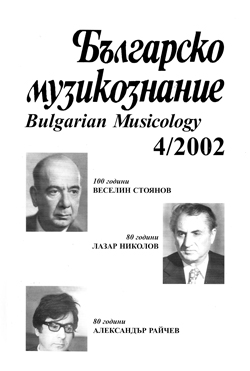Хармоничното мислене в Гротескната сюита „Бай Ганю" като музикално-езиково проявление на комичното в музиката на Веселин Стоянов
Harmonious Thinking in the Grotesque Suite "Bai Ganiu" as Music-Liguistic Manifestation of the Comic in Vesselin Stojanov's Music
Author(s): Mariana BulevaSubject(s): Music
Published by: Институт за изследване на изкуствата, Българска академия на науките
Summary/Abstract: The humour in Vesselin Stojanov’s music is usually connected with the plots and the program headings of the works, but his music manifestations on the level of sound height thinking have not been studied so far. The problem of humour in music is in itself very complicated and it is connected with the specifics of the music language as a secondary modeling system. The comparison as the inner essence of the funny is observed in the second half of the Grotesque suite “Bai Ganiu”, where a comic genre antithesis is realized (Vienna waltz - Bulgarian ruchenitza) and thus by musical means the effect of comedy of circumstances is achieved. In creating humorous imagery in the suite the possibilities of comic contamination are used, which on the basis of formal external signs unites specific national and romantic classical sound pitch and metro rhythmic means. The composer does not strive for internal transformation of the tonal sound height thinking, but combines simultaneously typically expressed musical and language components, which are the product of various types of music cultures. On the level of artistic suggestion, the national sensitivity with its traditional indices for modeling t he music space and time is included directly in the stream of the European linear idea of time and in its tempered sound space. The connection with Aleko Konstanti nov’s literary work is discovered in the composition conception, i n the dramaturgic solution, in the changeable close-ups of the author’s attitude to the hero. But the positive artistic conception of the music work provides a new creative perusal of the most popular Bulgarian literary character, affirming the vitality and ability of the Bulgarian national spirit to be recorded in the European civilization, to declare its own cultural value.
Journal: Българско музикознание
- Issue Year: 2002
- Issue No: 4
- Page Range: 39-55
- Page Count: 17
- Content File-PDF

